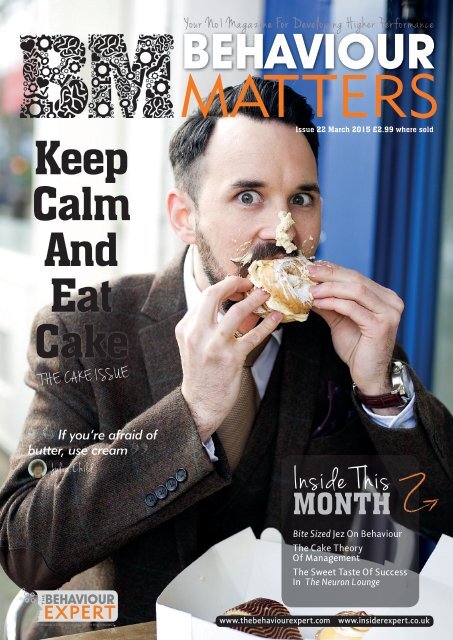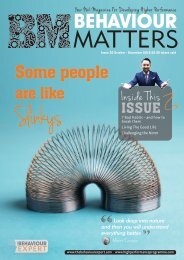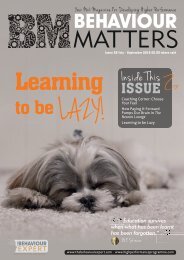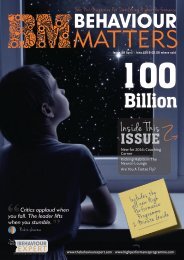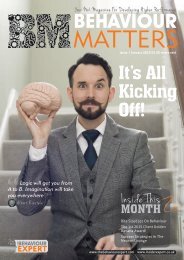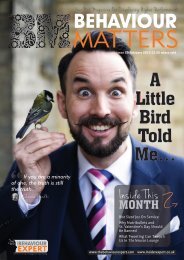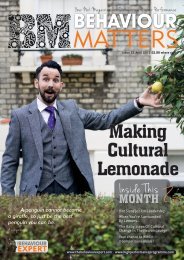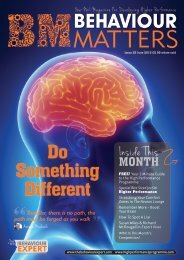Behaviour Matters March 2015
Create successful ePaper yourself
Turn your PDF publications into a flip-book with our unique Google optimized e-Paper software.
Your No1 Magazine For Developing Higher Performance<br />
BEHAVIOUR<br />
MATTERS<br />
Issue 22 <strong>March</strong> <strong>2015</strong> £2.99 where sold<br />
Keep<br />
Calm<br />
And<br />
Eat<br />
Cake<br />
THE CAKE ISSUE<br />
If you’re afraid of<br />
butter, use cream<br />
Julia Child<br />
Inside This<br />
MONTH<br />
Bite Sized Jez On <strong>Behaviour</strong><br />
The Cake Theory<br />
Of Management<br />
The Sweet Taste Of Success<br />
In The Neuron Lounge<br />
www.thebehaviourexpert.com<br />
www.insiderexpert.co.uk<br />
<strong>Behaviour</strong> <strong>Matters</strong> <strong>March</strong> <strong>2015</strong>.indd 1 10/03/<strong>2015</strong> 12:20
A Thought From Jez<br />
wont lie; I’m not in a very good mood. I’m on the Isle Of Man (or Isle<br />
I Of Mann, depending on who you speak to or where you look; half of<br />
them spell it with one ‘n’ and half of them with two - clearly they don’t<br />
speak to each other much). Anyway, that’s not why I’m grumpy.<br />
2<br />
You’d think that traveling such a short<br />
distance, from London, would be easy but<br />
it’s been one of the worst trips of my entire<br />
career. I don’t want this to turn into some sort<br />
of unremunerated therapy column so I’ll spare<br />
you all the details but needless to say I forgot<br />
my passport (the first time in 12 years) so<br />
arrived at the airport with little time to spare;<br />
was subject to the most thorough security<br />
check I’ve ever experienced (not like that, he<br />
just had a big hang up about the amount of<br />
liquids I had in my toiletries bag and I had to<br />
keep throwing things away to make room),<br />
got travel sick (the first time in about 10<br />
years) and the new bag I bought is awful: you<br />
can’t fit a suit in it, nor can you fold it up like<br />
they show you on the box. There. Rant over.<br />
Actually, I feel a bit better now.<br />
So I arrived at my hotel, at the exact<br />
opposite end of the town that the shops<br />
were in, walked to the shops to buy a few<br />
things I needed for my presentations (my<br />
international calling card is fast becoming a<br />
giant black rubbish bin with a hole cut out of<br />
the bottom of it, left at various international<br />
hotels and conference venues) and had<br />
a cup of tea and a slice of carrot cake in a<br />
coffee shop. And then, as I took a sip of that<br />
amber nectar and a mouthful of cake, the<br />
world suddenly went from grey to colour.<br />
My mood immediately lifted and all of the<br />
day’s stresses and strains melted away into<br />
the sweet, white frosting. What is it about<br />
eating cake that seems to make things so<br />
much better?! Well, undoubtedly the sugar<br />
certainly perks us up but things that we<br />
associate with good times and positive<br />
memories help to lift our mood and we thrive<br />
on the production of neurotransmitters,<br />
which they prompt the release of, such as<br />
dopamine (my personal favourite of all of<br />
C lient of the Month<br />
The Golden Banana Award<br />
Debbie Woodward, Galderma UK<br />
Congratulations to Debbie; the<br />
winner of this month’s Golden<br />
Banana Client of the Month award!<br />
Debbie’s team were faced with some very<br />
specific behaviour challenges when changes<br />
to how they were asked to sell were not being<br />
carried out, despite great evidence showing<br />
a more efficacious method, with greater<br />
potential. Having tried different approaches<br />
and with some people muting the idea of<br />
introducing punishment strategies if people<br />
didn’t comply, Debbie knew she had to win<br />
both the hearts and minds of her team in<br />
order to see changes. Together we devised<br />
some training and a strategy to assist with<br />
changing the way that her team responded<br />
to certain barriers, whilst up-skilling them.<br />
Debbie knew they had to do something<br />
different in order to get different results and<br />
when we spoke, she instinctively understood<br />
the need to not only inspire her team but to<br />
give them greater purpose and understanding<br />
of their roles.<br />
As a result, the conference was a huge success<br />
and the session Debbie was responsible for<br />
organising helped to change how her team<br />
approached selling and to embrace new<br />
behaviours.<br />
the neurotransmitters – I can’t believe I have<br />
a favourite neurotransmitter). Your ‘cake’<br />
might well be a run, or some fresh fruit but<br />
for most, one thing that’s almost guaranteed<br />
to lift the spirits and put a smile on the inside<br />
as well as your face, is something sweet,<br />
unexpected and reminiscent of a birthday<br />
party or other celebration. I’ll show you<br />
exactly how we can use this to our advantage<br />
in my feature article this month: The Cake<br />
Theory Of Management.<br />
But for now, keep calm and eat cake!<br />
www.thebehaviourexpert.com<br />
www.insiderexpert.co.uk<br />
<strong>Behaviour</strong> <strong>Matters</strong> <strong>March</strong> <strong>2015</strong>.indd 2 10/03/<strong>2015</strong> 12:20
Inside Jez’s<br />
Brain<br />
The Cake Theory<br />
Of Management<br />
If you follow me on facebook (www.facebook.<br />
com/thebehaviourexpert) you may have seen<br />
my recent post about cake and my Cake Theory<br />
of Management.<br />
Mrs Jez and I were in London just a few weeks ago, going to the<br />
theatre, and we passed a cake shop in Piccadilly, with some really<br />
delicious looking cakes in the window display. Mrs Jez didn’t see<br />
them at first but my head whipped around so quickly I thought I’d get<br />
whiplash: I saw them from the corner of my eye as we walked down<br />
the street, lit in a soft, warm glow, which accented all of the colours<br />
and gave a sparkle to the glaze. Just thinking about it has put a smile<br />
on my face.<br />
Inside the shop were a number of people eating cake and chatting<br />
and then it struck me: everyone inside the shop was smiling. So,<br />
theatre trip temporarily abandoned, I stopped and watched the cake<br />
shop, waiting for new people to go inside, to see if their behaviour<br />
would change. Mrs Jez is quite a patient person, which you’d have to<br />
be if you lived with me. Anyway, the next couple who walked in were<br />
clearly cold and they both seemed a little preoccupied, which is often<br />
They chose their cakes, ordered and began<br />
to tuck in. Within seconds of the cake<br />
touching their tongue, their eyes lit up, their<br />
shoulders relaxed and a smile spread across<br />
their face.<br />
indicated by the furrowed brow and darted looks around the room.<br />
They chose their cakes, ordered and began to tuck in. Within seconds<br />
of the cake touching their tongue, their eyes lit up, their shoulders<br />
relaxed and a smile spread across their face. And even though I’ve<br />
been applying it for many years now, it suddenly dawned on me then<br />
just how powerful the Cake Theory of Management is.<br />
I was first introduced to the concept by my boss when I worked in<br />
hospital, only she called it the Doughnut Theory of Management<br />
and at its most basic, it’s this: you buy people doughnuts and they’ll<br />
do what you want them to do. Or at least that’s how she explained<br />
it. However, it’s a little more complicated than that and deserves<br />
a little bit more respect because if you just buy people things and<br />
expect them to do what you want them to do, that’s not an especially<br />
reliable method of behaviour change. And if you tell them first that<br />
they’re going to get doughnuts if they do as they’re told then that’s<br />
technically a bribe and bribes don’t work for long because they<br />
quickly become a crutch for desirable behaviour: their behaviour<br />
becomes contingent on you buying them doughnuts. Which I’m sure<br />
they wouldn’t mind…<br />
The Cake Theory of Management (but, yes, it works equally well with<br />
doughnuts) is essentially based on the principle of reciprocity, with a<br />
sprinkling of the principle of the vital few and a touch of behavioural<br />
learning theory added for good measure. What does this all mean?<br />
Well, the next time your team, people in your charge or perhaps<br />
even your family, do something that is especially worth rewarding,<br />
or reinforcing, or encouraging, or something that you’re proud of<br />
that’s especially worthy of praise, go out to a bakery or supermarket<br />
and buy them cake. Mrs Jez and I have recently finished having our<br />
house renovated and while the builders were here, every day I went<br />
to the bakery and bought a different selection of cakes for them. As<br />
a result, they were more than happy to go the extra mile to help us<br />
with a few additional bits and stayed on late without charge. Now,<br />
I’m being candid and to the point here but don’t read this as bribery<br />
or manipulation because it’s not: I didn’t tell them I was going to buy<br />
cake on the condition that they worked harder, or specifically with<br />
a view to get them to do more work. I bought them cake to build a<br />
relationship; as a gesture of appreciation and reinforcement for the<br />
great work they were doing and because I know that cake makes<br />
people happy.<br />
Everyone at the hospital knew and valued my old boss: after all,<br />
who else bought them cake?! It’s a gesture that is unexpected;<br />
largely appreciated; seen as an act of kindness and perhaps most<br />
importantly of all, builds relationships. Don’t tell them you’re going<br />
to do it; don’t make the cake contingent on an outcome and do it<br />
unexpectedly and at times randomly. I promise it’ll pay dividends. The<br />
trick is to ask yourself: how would this make me feel?<br />
Don’t Forget...<br />
Like The <strong>Behaviour</strong> Expert<br />
facebook page. You can find it at<br />
www.facebook.com/thebehaviourexpert<br />
3<br />
<strong>Behaviour</strong> <strong>Matters</strong> <strong>March</strong> <strong>2015</strong>.indd 3 10/03/<strong>2015</strong> 12:20
4<br />
The Neuron<br />
The Sweet Taste Of Success<br />
There’s nothing quite like being right, is<br />
there? Especially when it comes to a family<br />
debate. Or that sense of great pride when<br />
you win a competition. I love that overpowering<br />
flush of fulfilment when you tick off<br />
the last of your things on your to-do list. And<br />
when that feel-good feeling puts you in a positive<br />
mood for the rest of the day, it can really<br />
set you up to have a good day - and the longer<br />
that feeling lingers, the better!<br />
That positive feeling is caused by the release of my favourite<br />
neurotransmitter, dopamine, also known as “the happy hormone” and<br />
it’s a sure-fire way to lift your spirits, lighten your mood and quite often<br />
put a smile across your boat race, too. Dopamine is the neurotransmitter<br />
that associates with happiness and reward and it’s released when<br />
something nice happens to us, or someone else is nice to us or shows us<br />
generosity, making us feel good as a result. The reason I’m such a fan of<br />
dopamine is because it’s release is prompted by so many things that we<br />
can engineer, from exercise to donating to charity and from indulging<br />
in a nice puffy chocolate éclair to completing a task on your to-do list.<br />
However, dopamine is used up very quickly, so the good feeling goes<br />
away and that leaves us wanting more. The affect of dopamine is so<br />
strong though that it motivates us to seek out more ways to get our<br />
fix. Now we don’t consciously seek out dopamine specifically of course,<br />
instead we go out of our way intensely looking for things that will make<br />
The reason I’m such a fan of dopamine is because<br />
it’s release is prompted by so many things<br />
that we can engineer, from exercise to donating to<br />
charity and from indulging in a nice puffy chocolate<br />
éeclair to completing a task<br />
us feel good, to trigger its release. We might buy another pair of shoes,<br />
another slice of banana cake or another book, for example. So if we can<br />
pair the great feeling we get when we reward ourselves with success,<br />
with an especially productive behaviour, such as completing our to-do<br />
list, the dopamine release can be used to our advantage in an especially<br />
clever way. If one of your fingers fell off every time you procrastinated<br />
www.thebehaviourexpert.com<br />
www.insiderexpert.co.uk<br />
<strong>Behaviour</strong> <strong>Matters</strong> <strong>March</strong> <strong>2015</strong>.indd 4 10/03/<strong>2015</strong> 12:20
or put something off that you actually needed to do, or your car burst<br />
into flames every time you consciously put in only half the effort, you<br />
wouldn’t do those things again would you?! You wouldn’t do them<br />
because they had negative consequences for you. With the exception<br />
of forced behaviours, the only reason we repeat behaviours is because<br />
we enjoy them or they make us feel good: they are positively reinforced.<br />
Now, “success” is subjective and interestingly, when I ask people what<br />
success means to them, I can get a real variety of answers, from “making<br />
lots of money” to “hitting all of my targets” and from “feeling a sense<br />
of accomplishment and achievement” to “getting all of my jobs done”.<br />
Whatever success means to you, the affect that being successful has<br />
on us is the same; it makes us feel good but very often that little squirt<br />
of dopamine isn’t enough when you’re under pressure, have a load<br />
more tasks to do, or don’t give yourself sufficient credit for what you’ve<br />
achieved. How often have you completed a task, hit a target or otherwise<br />
succeeded, only for you to plough on with other things? You deserve to<br />
take just a few moments, or the time it takes to make a fresh cup of<br />
tea, to reflect and wallow in that good feeling because only when you<br />
do that will you start to pair achievement and success with the positive,<br />
feel-good effects. That’s why it’s so important to enjoy that moment<br />
this has at some point experienced at least one of those scenarios –<br />
and probably fairly recently, too! We’ll assume you’ve broken down<br />
the tasks into manageable chunks, but if you haven’t, take a look at<br />
this month’s Success Strategies feature as there are some tips on how<br />
to better manage your time and, perhaps unsurprisingly, strategies<br />
for success, too. What we do to encourage or inhibit, intentionally or<br />
otherwise, our success is important because before we even get to the<br />
point of that sweet taste of success, we’ve potentially set ourselves up<br />
to fail, or at least make it much harder for ourselves. If we don’t enjoy<br />
the journey to success, we get measurably less enjoyment out of the<br />
end point; the destination; the result, making the whole thing all the<br />
more unbearable and difficult. Conversely, if we make the journey more<br />
frequently rewarding, by allowing ourselves to bask in our dopamineenriched<br />
glory, we’ll not only achieve more but are likely to do so much<br />
more efficiently, too.<br />
So how can you do it? What can you do to make all of your tasks feel all<br />
the more successful? How can you get a bigger taste of the bigger slice<br />
of the success strudel? Largely by being more conscious of the fact that<br />
we need to literally feel the success we create; by engineering ways to<br />
“top up” that feeling of success with something that you know you enjoy,<br />
Lounge<br />
5<br />
of success and reinforce it with something that also makes you feel<br />
good, such as cake: you ride on the back of the natural reinforcement<br />
(dopamine) with an engineered one (cake, or a run or a chapter of<br />
your favourite book) to greater enhance the feeling of success. This in<br />
turn helps you to get things done that will make you more successful,<br />
whatever that means to you.<br />
or that you know will make you feel good and by making your journey to<br />
success as simple and regularly reinforced as you can.<br />
Imagine this: you’ve got a lot of things on your task list to get done but<br />
you’re just not feeling on top of it all. Perhaps you’re a little overwhelmed,<br />
or you’re distracted by the sheer amount of work and struggling to get<br />
your head down and get on with it. Maybe you’re under a bit of pressure<br />
with timescales, or you’re not entirely sure what to do in order to<br />
progress. Sound familiar? You’re not alone! I imagine everyone reading<br />
The chains of habit are generally<br />
too small to be felt until they are too<br />
strong to be broken<br />
Samuel Johnson<br />
<strong>Behaviour</strong> <strong>Matters</strong> <strong>March</strong> <strong>2015</strong>.indd 5 10/03/<strong>2015</strong> 12:20
Extracts Fr om<br />
6<br />
It’s not me, it’s you. It never<br />
fails to amuse me when<br />
people blame others for not<br />
carrying out what they were<br />
told when the only information<br />
they had to go on was<br />
what they were given. It almost<br />
always isn’t the other<br />
persons fault – it’s yours.<br />
You failed to communicate in a way<br />
that they understood, or didn’t provide an<br />
environment whereby they felt confident<br />
enough to question your instructions, or you failed to check their<br />
understanding or failed to monitor their output. The sooner we start taking<br />
100% responsibility for our decisions and choices and the consequences<br />
of those choices, the better we’ll all be and the quicker we’ll start<br />
getting extraordinary results. It’s sometimes very difficult for people to<br />
comprehend that their own conscious understanding of something, cannot<br />
be grasped by someone else. It’s like looking at an orange and the other<br />
person calling it a banana. But that’s how it is for some people. Personally,<br />
I wish I met more people than saw bananas, where I saw oranges. That<br />
reminds me of an illegal rave I worked at once (I was there in a professional<br />
capacity!), where drugs and alcohol use was in abundance. One man wasn’t<br />
overly enjoying his LCD-induced high because he’d begun hallucinating,<br />
seeing the other ravers as fruit. Where I saw a sweaty, wide-eyed, pale man<br />
gurning the life out of his jaw, he saw an apple. Where I saw a girl covered in<br />
beer, jumping around, swinging her hair to the incessant beat of the noise<br />
- sorry, music, he saw a pear. And this man took it upon himself to sort the<br />
other ravers (read pieces of fruit), into fruit bowls, grouping them into nice<br />
selections of oranges, bananas, pears, apples etc. I imagine when he’s not<br />
off his face on acid, he’s a very tidy man; very organised. Only, no-one else<br />
shared his hallucination and simply saw him as a man dragging them away<br />
from the friends they were with, to join a group of other bewildered people,<br />
equally high and undoubtedly experiencing their own hallucinations. As the<br />
fruit bowl task became more and more of a disaster, with bananas, apples<br />
and plums wandering off from their respective bowls and mixing with<br />
other fruits, the man became more and more distressed. It was one of the<br />
strangest things I’ve ever experienced.<br />
The behaviour you want to see more of must be reinforced. Be<br />
patient though and reinforce any and all behaviours that are even a<br />
Bite Sized Jez<br />
tiny bit in the direction towards the<br />
final behaviour you’re looking for.<br />
Don’t wait out to get the complete,<br />
perfect, finished product because<br />
often we need encouragement and<br />
recognition of our journey towards<br />
the end goal. If you taught basket<br />
weaving or pottery or even baking<br />
and waited before reinforcing<br />
anyone until they produced a perfect<br />
basket, a finished pot or a tasty pie,<br />
you’d be there, probably alone, for a<br />
long time.<br />
The reinforcer must be<br />
reinforcing! Remember that what<br />
one person finds reinforcing, another won’t. Discover what it is that the<br />
individual finds reinforcing; a verbal “excellent!”, a hand written note,<br />
time out to call them, a bar of chocolate, recognition in front of their<br />
team?<br />
Before they carry out the task, discover if there are any existing, or<br />
anticipated, barriers that may prevent the task, or their understanding<br />
of the task. When you’ve discovered them, work to remove them. It’s<br />
not all about the money. Remember that people want purpose, so<br />
empower them to achieve something more; be a part of something in<br />
which they can be proud and share their achievement with others. In<br />
turn, this becomes reinforcing and is a very powerful strategy. One of<br />
the simplest ways to achieve this is to offer responsibility for a part of<br />
the task or overall project, for example.<br />
By Jez Rose, published by Dr. Zeus Publishing<br />
ISBN: 978-0-9930136-1-4 (Hardback), 978-0-9930136-2-1 (Paperback)<br />
Released <strong>March</strong> <strong>2015</strong>.<br />
Available for just £9.99<br />
if you pre-order in hardback<br />
before 23rd <strong>March</strong><br />
(release price £14.99)<br />
www.beapurplebanana.com<br />
On <strong>Behaviour</strong><br />
Start with just one thing that you want to change, or adapt. C learly define it. Now really work at<br />
it regularly (say, three times a day) to create a new habit of it. Once we’ve established just one or two new habits<br />
or routines, others that support those new ones often fall into place on their own but frequently people try to<br />
change too much at once. Don’t neglect that often the smaller things can make the biggest differences, too.<br />
www.thebehaviourexpert.com<br />
www.insiderexpert.co.uk<br />
<strong>Behaviour</strong> <strong>Matters</strong> <strong>March</strong> <strong>2015</strong>.indd 6 10/03/<strong>2015</strong> 12:20
Unlocking Success<br />
In 6<br />
Seconds<br />
The Tick Tock of Time Management<br />
All the time you’re reading this, the clock is<br />
ticking. That’s four and a bit seconds of your<br />
life gone already. You’ve probably heard me talk<br />
about how finite our time is; a reminder I think<br />
we all need from time to time, and how important<br />
I believe it is to do the right thing while<br />
we’re here by respecting the time we do have<br />
and consciously using it to be better people.<br />
That might well mean doing the things you don’t currently have<br />
time for: spending more time with your children, your spouse or<br />
your pets; going on holiday more often for a well-deserved break,<br />
or simply getting home at a decent time.<br />
Everyone has the same amount of time; the same 24 hours and<br />
never has the maximum of taking 100% responsibility for our<br />
behaviour and the consequences of our actions been more relevant<br />
than when it comes to managing our time. As you can’t get any<br />
more time, and never will, it’s all about how we better manage our<br />
time, to maximise the time we do have and use it so well that it<br />
actually frees up more available time.<br />
Here are my top tips for effective time management:<br />
1: Break tasks down into smaller, more easily achievable tasks, to<br />
offer you more opportunities to experience stages of success. This<br />
will help you to fit things into smaller time gaps, stop more frequently<br />
and most importantly, experience a greater sense of reward.<br />
2: Find out when you’re at your most productive. Some people are<br />
morning people, like me, and others come alive in the afternoon. I<br />
once met a very successful sales person at a conference who did all<br />
of his lead generation calls in the evening, at home with a glass of<br />
wine in his hand.<br />
3: Do the right things rather than trying to do everything right: it<br />
doesn’t matter how well you polish the underside of the bannister.<br />
What things are time critical and have a looming time deadline?<br />
Do those things first. What else is important and urgent? Urgency<br />
always trumps in the order of importance yet we often get distracted<br />
by other things.<br />
4: Turn off your email and telephone tones. Research shows that<br />
each time you are distracted, it takes an average of 4 minutes to<br />
return to the level of concentration, focus and performance you<br />
were at. Think about how often you’re interrupted at work and how<br />
much ruined time that creates.<br />
5: Use “dead time” effectively” make calls in the car, while running<br />
or cycling, or outsource tasks to fiverr.com, peopleperhour.com or<br />
dictate notes to be typed up by a secretary or typist while you’re<br />
asleep or on a flight for example.<br />
6: Be realistic! You need to sleep for a minimum of 8 hours a day and<br />
you need to eat. There are only 24 hours in a day, so don’t cram your<br />
days with unrealistic targets.<br />
The ship that you’re<br />
waiting for to come in may<br />
very well be the ship that<br />
you need to build<br />
Unknown<br />
7<br />
Have You?...<br />
downloaded the FREE Expert Video<br />
Series on Essential Leadership Skills?<br />
Text the word LEAD and your name and email<br />
address to 88802 to get your download link!<br />
<strong>Behaviour</strong> <strong>Matters</strong> <strong>March</strong> <strong>2015</strong>.indd 7 10/03/<strong>2015</strong> 12:20
News in Brief<br />
WHO’S YOUR P IN UP?<br />
You’ll be able to read a special feature article<br />
about me in the May issue of Start Your<br />
Business magazine and enjoy a huge picture<br />
of my face, as they’re featuring me as their<br />
cover story. Move aside those posters of<br />
Ronan Keating and Beyonce and leave a little<br />
bit of space for yours truly.<br />
will naturally send you a slice of cake, so you<br />
don’t miss out!<br />
WHOSE LINE IS I T ANYWAY?<br />
I was presenting a conference in Southampton<br />
recently and one of the delegates came out<br />
with this cracker of a line, in response to<br />
suggesting a statement that summed up what<br />
being a changemaker was: “I used to wonder<br />
why somebody didn’t do something about<br />
that; then I realised I am that somebody.”<br />
8<br />
GET YOUR DOP AMINE<br />
F IX HERE<br />
The Contented Dementia Trust, my adopted<br />
charitable partner, are fundraising for<br />
£25,000 to create an online e-learning<br />
platform to teach the basic stages of<br />
understanding and implementing the SPECAL<br />
method for managing dementia. You can<br />
make a donation to help them raise their<br />
target here: http://bit.ly/1E9FUsW<br />
DING DONG!<br />
Listen out for the wedding bells because Mrs<br />
Jez and I are getting married on 14th <strong>March</strong>,<br />
after which I’ll be a fully-fledged married<br />
man! We’re very excited (Mrs Jez just keeps<br />
crying, which I think is with excitement) and<br />
MAY YOU ALWAY S<br />
REMEMBER THIS<br />
Look out for what will be the biggest, most<br />
exciting project I’ve worked on to date,<br />
launching in May. We’re busy bringing all of<br />
my training services and products under one<br />
new brand, with a brand new culture change<br />
programme launching with it. If you’re<br />
interested in developing higher performance<br />
in yourself, your team, or in specific areas like<br />
leadership or service, you’re going to FREAK<br />
when you see what we’ve created!<br />
CHEER UP!<br />
Did you know that there is a gene that can<br />
cause you to be negative most of the time?<br />
So maybe that miserable one you have to<br />
work with is simply suffering from a genetic<br />
disorder - still makes you want to throw a<br />
custard pie in their face though, doesn’t it?<br />
JAW S<br />
A shark weighs 600 kilos plus 1/3 of its<br />
weight. What does it weigh?<br />
Grab a coffee and a pencil to scratch your head with…<br />
YOUR LET T ER<br />
What letter should replace the question<br />
mark?<br />
B D F H J N P ?<br />
Do you know someone who’d love a copy of <strong>Behaviour</strong> <strong>Matters</strong>?<br />
Maybe a friend, colleague or least favourite child? Email their name and address to orders@thebehaviourexpert.com and<br />
we’ll post them a copy each month absolutely FREE! Ask us nicely in the email and we’ll also send you a little something in<br />
the post to thank you for helping us to widen distribution of <strong>Behaviour</strong> <strong>Matters</strong>.<br />
Contact The <strong>Behaviour</strong> Expert<br />
7 Merlin Centre, Aylesbury, HP19 8DP<br />
www.thebehaviourexpert.com<br />
LOST<br />
A person visiting a strange country with<br />
no map comes to a crossroads where a<br />
signpost has been knocked down. How can<br />
they find their way without asking anyone<br />
for directions?<br />
Join in the fun here!<br />
@JezRose<br />
www.facebook.com/thebehaviourexpert<br />
<strong>Behaviour</strong> <strong>Matters</strong> <strong>March</strong> <strong>2015</strong>.indd 8 10/03/<strong>2015</strong> 12:20


